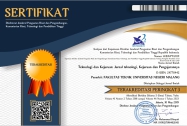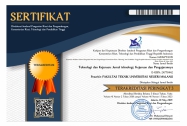Analysis of The Correlation Between Mechanical Engineering Research and COVID-19 Situation: Bibliometric Study
Abstract
Keywords
Full Text:
PDFReferences
Adam, C., & Bengler, K. (2021, May). It Takes Two to Tango: Communication at Work During the COVID-19 Pandemic. In Proceedings of the 21st Congress of the International Ergonomics Association (IEA 2021), 4, 495-503. Doi: 10.1007/978-3-030-74611-7_67
Al Husaeni, D. F., & Nandiyanto, A. B. D. (2022). Bibliometric computational mapping analysis of publications on mechanical engineering education using vosviewer. Journal of Engineering Science and Technology, 17(2), 1135-1149. Retrieved from http://jestec.taylors.edu.my/Vol%2017%20Issue%202%20April%20%202022/17_2_23.pdf
Alvarado-Silva, C. A., Tejeda-Ponce, A. D., Ulloa-Rubio, B., Salas-Ruiz, J. A., & Gaytan-Reyna, K. L. (2023). Analysis of the Academic Performance of Mechanical-Electrical Engineering Students during the COVID-19 Pandemic: A Case Study in a Private University in Peru. International Journal of Information and Education Technology, 13(5), 867-72. Doi: 10.18178/ijiet.2023.13.5.188
Ardolino, M., Bacchetti, A., Dolgui, A., Franchini, G., Ivanov, D., & Nair, A. (2022). The Impacts of digital technologies on coping with the COVID-19 pandemic in the manufacturing industry: a systematic literature review. International Journal of Production Research, 1-24. Doi: 10.1080/00207543.2022.2127960
Arizal, H., Ningsih, T. H., Ramadani, A. H., Nurjannah, I., & Mubarok, H. (2022). Analysis of Graduate Relevance to Program Learning Outcome Mechanical Engineering in State University of Surabaya. IJORER: International Journal of Recent Educational Research, 3(1), 61-70. Doi: 10.46245/ijorer.v3i1.180
Casado-Aranda, L. A., Sánchez-Fernández, J., & Viedma-del-Jesús, M. I. (2021). Analysis of the scientific production of the effect of COVID-19 on the environment: A bibliometric study. Environmental Research, 193, 110416. Doi: 10.1016/j.envres.2020.110416
Chai, C. W., Chao, T. W., & Huang, Y. H. (2021). Research on the Application of Educational Robots for Distance Teaching in Rural Area for Post-COVID-19-taking the Cultivation of Seed Talent Students of Indigenous Tribes as an Example. In 2021 IEEE 4th International Conference on Knowledge Innovation and Invention (ICKII), 223-229. Doi: 10.1109/ICKII51822.2021.9574777.
Cordeiro, M. C., Santos, L., Angelo, A. C. M., & Marujo, L. G. (2022). Research directions for supply chain management in facing pandemics: an assessment based on bibliometric analysis and systematic literature review. International Journal of Logistics Research and Applications, 25(10), 1313-1333. Doi: 10.1080/13675567.2021.1902487
Elyan, E., Jamieson, L., & Ali-Gombe, A. (2020). Deep learning for symbols detection and classification in engineering drawings. Neural Networks, 129, 91–102. Doi: 10.1016/j.neunet.2020.05.025
Evstatiev, B., Hristova, T., & Gabrovska-Evstatieva, K. (2022). Investigation of Engineering Students’ Attitude towards Virtual Labs during the COVID-19 Distance Education. International Journal of Electrical and Electronic Engineering & Telecommunications, 1-12. Doi: 10.18178/ijeetc.11.5.373-384
Furstenau, L. B., Rabaioli, B., Sott, M. K., Cossul, D., Bender, M. S., Farina, E. M. J. D. M., ... & Bragazzi, N. L. (2021). A bibliometric network analysis of coronavirus during the first eight months of COVID-19 in 2020. International Journal of Environmental Research and Public Health, 18(3), 952. Doi: 10.3390/ijerph18030952
Gupta, R., Rathore, B., & Biswas, B. (2022). Impact of COVID-19 on supply chains: lessons learned and future research directions. International Journal of Quality & Reliability Management, 39(10), 2400-2423. Doi: 10.1108/IJQRM-06-2021-0161
Ibda, H., Wulandari, T. S., Abdillah, A., Hastuti, A. P., & Mahsum, M. (2023). Student academic stress during the COVID-19 pandemic: A systematic literature review. International Journal of Public Health Science (IJPHS), 12(1), 286-295. Doi: 10.11591/ijphs.v12i1.21983
Ivanov, D., & Dolgui, A. (2021). OR-methods for coping with the ripple effect in supply chains during COVID-19 pandemic: Managerial insights and research implications. International Journal of Production Economics, 232, 107921. Doi: 10.1016/j.ijpe.2020.107921
Jahangiri, S., Abolghasemian, M., Ghasemi, P., & Chobar, A. P. (2023). Simulation-based optimisation: analysis of the emergency department resources under COVID-19 conditions. International journal of industrial and systems engineering, 43(1), 1-19. Doi: 10.1504/IJISE.2023.128399
Kapilan, N., Vidhya, P., & Gao, X. Z. (2021). Virtual laboratory: A boon to the mechanical engineering education during covid-19 pandemic. Higher Education for the Future, 8(1), 31-46. Doi: 10.1177/2347631120970757
Khamis, N. K., Wahid, Z., & Mohamed, I. F. (2023, April). Challenges in coordinating and conducting an integrated group project in mechanical engineering during COVID-19 pandemic phase: A case study. In AIP Conference Proceedings, 2544(1). Doi: 10.1063/5.0116348
Kumar, S., Raut, R. D., & Narkhede, B. E. (2020). A proposed collaborative framework by using artificial intelligence-internet of things (AI-IoT) in COVID-19 pandemic situation for healthcare workers. International Journal of Healthcare Management, 13(4), 337-345. Doi: 10.1080/20479700.2020.1810453
Kuznyetsova, A., Sydorchenko, T., Zadvorna, O., Nikonenko, U., & Khalina, O. (2021). Assessment of aspects of the COVID-19 crisis in the context of ensuring economic security. International Journal of Safety and Security Engineering, 11(6), 615-622. Doi: 10.18280/ijsse.110601
Mandal, N. K., Azad, A. K., & Rasul, M. G. (2023). On students learning experience of fluid power engineering–Impact of simulation software. International Journal of Mechanical Engineering Education, 03064190231176133, 1-14. Doi: 10.1177/03064190231176133
Mohammed, A. S. (2021). Experience Sharing on Virtual COOP Training to Mechanical Engineering Students during the COVID-19 Pandemic. Sustainability, 13(20), 11401. Doi: 10.3390/su132011401
Mustapha, I., Van, N. T., Shahverdi, M., Qureshi, M. I., & Khan, N. (2021). Effectiveness of Digital Technology in Education During COVID-19 Pandemic. A Bibliometric Analysis. International Journal of Interactive Mobile Technologies, 15(8). 136-154. Doi: 10.3991/ijim.v15i08.20415
Nandiyanto, A. B. D., Al Husaeni, D. N., & Al Husaeni, D. F. (2021). A bibliometric analysis of chemical engineering research using vosviewer and its correlation with covid-19 pandemic condition. Journal of Engineering Science and Technology, 16(6), 4414-4422. Retrieved from: https://jestec.taylors.edu.my/Vol%2016%20Issue%206%20December%20%202021/16_6_4.pdf
Neb, A., Briki, I., & Schoenhof, R. (2020). Development of a neural network to recognize standards and features from 3D CAD models. Procedia CIRP, 93, 1429–1434. Doi: 10.1016/j.procir.2020.03.010
Ong, A. K. S., Prasetyo, Y. T., Young, M. N., Diaz, J. F. T., Chuenyindee, T., Kusonwattana, P., ... & Redi, A. A. N. P. (2021). Students’ preference analysis on online learning attributes in industrial engineering education during the COVID-19 pandemic: A conjoint analysis approach for sustainable industrial engineers. Sustainability, 13(15), 8339. Doi: 10.3390/su13158339
Paul, G. R., & Perwez, S. K. (2023). Mindful Organizations: a Bibliometric Study to Provide Insights Into the Interplay Between Mindfulness and Psychological Capital in the Workplace. International Journal of Professional Business Review, 8(3), e01367-e01367. Doi: 10.26668/businessreview/2023.v8i3.1367
Peddireddy, D., Fu, X., Wang, H., Joung, B. G., Aggarwal, V., Sutherland, J. W., & Jun, M. B. G. (2020). Deep Learning Based approach for identifying conventional machining processes from CAD data. Procedia Manufacturing, 48, 915–925. Doi: 10.1016/j.promfg.2020.05.130
Peng, T., He, Q., Zhang, Z., Wang, B., & Xu, X. (2021). Industrial internet-enabled resilient manufacturing strategy in the wake of COVID-19 pandemic: a conceptual framework and implementations in China. Chinese Journal of Mechanical Engineering, 34(1), 1-6. Doi: 10.1186/s10033-021-00573-4
Priya, S. S., Priya, M. S., Jain, V., & Dixit, S. K. (2022). An assessment of government measures in combatting COVID-19 using ISM and DEMATEL modelling. Benchmarking: An International Journal, 29(5), 1429-1451. Doi: 10.1108/BIJ-05-2021-0244
Puram, P., Gurumurthy, A., Narmetta, M., & Mor, R. S. (2022). Last-mile challenges in on-demand food delivery during COVID-19: understanding the riders' perspective using a grounded theory approach. The International Journal of Logistics Management, 33(3), 901-925. Doi: 10.1108/IJLM-01-2021-0024
Romadlon, F., Lestiana, F., & Putri, N. A. (2022). An Exploration of Personal Decision as Mediating Effect between Passenger Concern and Airport Service Information During COVID-19 Outbreak. International Journal of Technology, 13(3), 664-676. Doi: 10.14716/ijtech.v13i3.4887
Samanta, S., Rautaray, B., & Swain, D. K. (2023). Intellectual structure and pattern of publication in the International Journal of Innovation Science: a bibliometric study. International Journal of Innovation Science, 15(2), 279-301. Doi: 10.1108/IJIS-06-2021-0103
Sharma, G. V. S. S. (2023). Spatial visualization for development of visual thinking and cognitive abilities among mechanical engineering students through tool design ideation. International Journal of Mechanical Engineering Education, 34(2), 386-407. Doi: 10.11591/ijphs.v12i1.21983
Shinde, P. P., & Shah, S. (2018). A Review of Machine Learning and Deep Learning Applications. Proceedings - 2018 4th International Conference on Computing, Communication Control and Automation, ICCUBEA 2018, 1–6. Doi: 10.1109/ICCUBEA.2018.8697857
Sivankalai, S., & Badhusha, K. N. (2020). Bibliometric study on COVID 19 Outbreak. International Journal of Library and Information Studies, 10(2), 1-19. Retrieved from https://www.researchgate.net/profile/Sivankalai-Sivankalai/publication/342661633_Bibliometric_study_on_COVID_19_Outbreak/links/5eff261b458515505087ac65/Bibliometric-study-on-COVID-19-Outbreak.pdf
Susanty, A., Bakhtiar, A., Prasetya, F., Maher, H., Setiawan, J. D., Chiou, C. C., & Wood, D. (2021, April). Indicators for measuring the impact of COVID-19 on supply chain vulnerability of SMEs. In 2021 IEEE 8th International Conference on Industrial Engineering and Applications (ICIEA), 439-443. Doi: 10.1109/ICIEA52957.2021.9436816.
Tahir, S. Z. B. (2021). Designing English teaching model at the remote area schools of Maluku in Covid-19 pandemic situation. In Proceedings of the 11th Annual International Conference on Industrial Engineering and Operations Management, 3933-3939. Retrieved from https://www.researchgate.net/profile/Saidna-Bin-Tahir/publication/350400272_Designing_English_Teaching_Model_at_the_Remote_Area_Schools_of_Maluku_in_Covid-19_Pandemic_Situation/links/60f6a5a4fb568a7098c053b6/Designing-English-Teaching-Model-at-the-Remote-Area-Schools-of-Maluku-in-Covid-19-Pandemic-Situation.pdf
Tosato, M., Ciciarello, F., Zazzara, M. B., Pais, C., Cacciatore, S., Montenero, R., Leone, M. S., Chisci, E., Picca, A., Galluzzo, V., Coelho-Junior, H. J., Calvani, R., Marzetti, E., & Landi, F. (2022). Lifestyle Changes and Psychological Wellbeing in Older Adults During Covid-19 Pandemic. Clinics in Geriatric Medicine, 1–11. Doi: 10.1016/j.cger.2022.05.002
Tsang, E., Van Haneghan, J., Johnson, B., Newman, E. J., & Van Eck, S. (2001). A report on service-learning and engineering design: service-learning's effect on students learning engineering design inIntroduction to Mechanical Engineering'. International Journal of Engineering Education, 17(1), 30-39. Retrieved from https://www.ijee.ie/articles/Vol17-1/Ijee1176.pdf
Zhang, B., & Ming, C. (2023). Digital Transformation and Open Innovation Planning of Response to COVID-19 Outbreak: A Systematic Literature Review and Future Research Agenda. International Journal of Environmental Research and Public Health, 20(3), 2731. Doi: 10.3390/ijerph20032731
DOI: http://dx.doi.org/10.17977/um031v45i22022p142-150
Refbacks
- There are currently no refbacks.
Copyright (c) 2023 Teknologi dan Kejuruan: Jurnal Teknologi, Kejuruan, dan Pengajarannya
Teknologi dan Kejuruan: Jurnal Teknologi, Kejuruan, dan Pengajarannya
E-ISSN 2477-0442 (online)
Contact
Faculty of Engineering, Universitas Negeri Malang (UM)
Jl. Semarang No 5 Malang 65145, Building H5, 1st Floor.
Homepage: http://journal2.um.ac.id/index.php/teknologi-kejuruan
Email: teknologikejuruan.ft@um.ac.id

This work is licensed under a Creative Commons Attribution 4.0 International License.



2.png)
1.png)
1.png)
1.png)
4.png)
1.png)
.png)

3.png)
1.png)
1.png)


